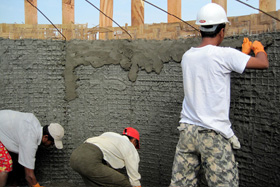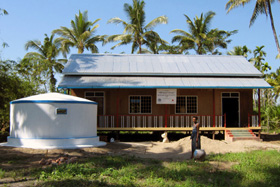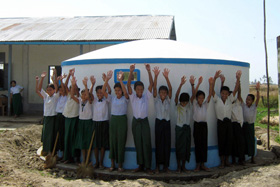Background and Objectives
Background

The Goal of the project is to 'improve the health of families in the Delta by providing access to safe water and sanitation facilities, while raising awareness of hygiene and health related issues'. A guiding principal is to Build Back Better and not to simply return people to Pre-Nargis standards. The project aim is to ensure that access to water, sanitation and awareness of health and hygiene related issues are all enhanced as a result of this project. The post Nargis Recovery and Reconstruction Plan (PONREPP) - December 2008 - clearly identifies the need for a three year reconstruction programme. This project is designed to support PONREPP's objective.
Objectives
-Improve water supply and sanitation services to 250 villages;
-Raise awareness of health and hygiene (H&H) practices in order to change existing practises;
-Collaborate with other agencies and donors for maximum impact and positive change in villages;
-Empower communities to take control of reconstruction in their villages;
-Empower women to adopt leadership roles in the community.
Activities

-Construction, repair and upgrading of village level communal water and sanitation systems including repair and reconstruction of 250 village ponds, and Communal Rain Water Collection Tanks to 250 villages; renovation of 300 wells;
-Construction of new water and sanitation facilities to 38 priority schools. Build Rain Water Collection Tanks at 143 schools (in addition to 38 in the priority schools);
-Construction and repair of rainwater collection and sanitation facilities for 1,500 vulnerable households;
-Hygiene promotion and Health Education training at community and school level;
-Training of artisans and communities in construction techniques relating to sanitation and maintenance of sanitation systems, water testing and surveillance.
Results (2009)

-To date 197 Community Contracts have been signed and the process was simple, systematic and transparent. Standard Community Contracts are in Myanmar language, signed by the three representatives of Water and Sanitation Recovery Committee and witnesses from the Village Peace and Development Committee (VPDC);
-After agreeing with communities necessary arrangements were done at UN-HABITAT Yangon office for the payment of installments: 80% and 20%;
-Communities play the lead role and entail responsibility for all kinds of labour management, procurement, quality maintenance, progress reporting, and completion. Cash books and financial reports are always made available for communities to verify transparency;
-The social impact of the project's prioritization of women's empowerment is very visible, women feel more confident to undertake decisions and actions in benefit of their communities.
Development Partners / Partners
Development Partners: Government of Japan
Partners: Ministry of Social Welfare, Relief and Resettlement, Ministry of Construction, Shelter Cluster Partners
- The Project for Emergency Support to Poor and Vulnerable Communities in Ethnic Areas
- A Short Step from Improved WASH to Healthier Communities
- The Programme for Emergency Assistance to Poor and Vulnerable Community in Ethnic Minority Areas and Yangon
- Safe and Sustainable Access to WASH for Rural Communities
- Shelter Recovery Programme – Post Giri Affected Areas
- Shae Thot ‘The Way Forward’
- Land Administration and Management Programme (LAMP) in Myanmar
- Safer Coastal and Urban Communities through DRR in Myanmar
- Disaster Risk Reduction for Safe & Resilient Burmese Coastal Communities
- The Programme for Development and Rehabilitation of Community in Ethnic Minority Area, Myanmar
- Myanmar Climate Change Alliance (MCCA)
- Rebuilding Homes-Rebuilding Lives – Coastal Settlements Sustainable Recovery (CSSR)
- Rebuilding Homes-Rebuilding Lives – Coastal Settlements Support Programme (CSSP)
- Coastal Communities Livelihood Assistance Programme (CLAP)
- Disaster Response & Preparedness – Resilient Coastal Communities and Urban Risk (DRP-CURB)
- Shelter Improvement and Disaster Risk Reduction Project
- Community Water Supply and Sanitation Recovery
- Community Based Disaster Risk Reduction (CBDRR)
- Support to the Coordination of Early Recovery Shelter Interventions-Shelter Cluster Lead
- Semi-permanent Schools in Ayeyarwady Delta in Myanmar / Multi-purpose Schools in Ayeyarwady Delta in Myanmar






































